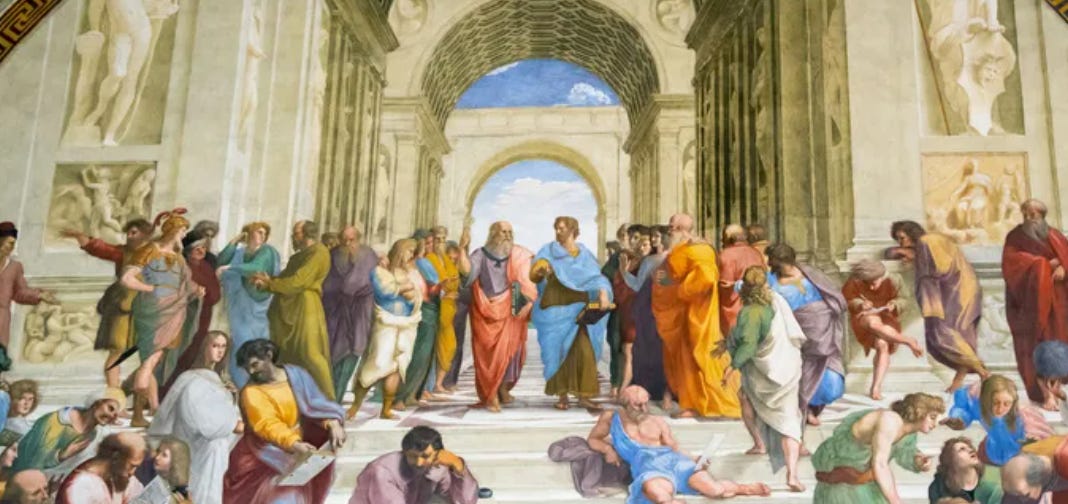NBN Newsletter #17
Featuring New Books in Sports and an interview with Professor Michah Gottlieb
Opening Day

Today is Opening Day, the start of the American baseball season. Pictured above are the 1927 New York Yankees sluggers AKA The Murderers’ Row. The ‘27 Yankees are often considered the greatest team ever assembled, headlined by the legends Lou Gehrig and Babe Ruth. Ruth revolutionized the sport by hitting more home runs than anyone before. He likely would have hit more homers, but he spent years as a two-way player, both hitting and pitching. For a long time, Ruth was the face of baseball, synonymous with America’s pastime.
In recent decades, baseball has gone global, with many of its players hailing from Latin America and East Asia. Just 10 days ago, a sea change occurred at the World Baseball Classic, when Japan defeated the USA in a nail-biter. Shohei Ohtani, a pitcher and slugger like Ruth, capped off an epic event by striking out America’s perennial MVP, Mike Trout. Tonight, when Ohtani takes the field, he’ll do so for the Los Angeles alongside his teammate, Trout. Could they be the next Babe and Lou?
This week, we feature the podcast channel, New Books in Sports.
Scholarly Sources
Michah Gottlieb is Associate Professor of Jewish Thought & Philosophy at New York University.
Q: What are you reading right now?
A: I recently finished The Choice by Edith Eger. Eger is a Holocaust survivor who became a psychologist and wrote this book at age 90. She explains how she used lessons she learned from her experience in the death camps to help her patients. We often think that those who experience extreme suffering are shaped by challenges that are fundamentally different than those most people experience. Eger shows that all suffering is on a continuum.
I’m also reading a wonderful 19th-century book called Spiritual Accounting by Mendel Lefin. Lefin was a member of the Jewish Enlightenment and this book is a work of practical advice about how to improve one’s character. Lefin’s advice centers on tools for moral improvement that he encountered in Benjamin Franklin’s autobiography. But Lefin greatly develops these tools and uses parables and stories, drawing both on traditional religious texts and travelogues describing expeditions to America and the Far East.
Q: What is your favorite book or essay to assign to give to people and why?
Josef Pieper’s 1949 book Leisure the Basis of Culture was incredibly eye-opening. I regularly teach ancient and medieval philosophy, and one thing that students find most difficult to understand is why the ancients and medievals regarded intellectual contemplation as the greatest happiness. When students look at professors, they generally don’t see especially happy people. Pieper explains that the intellectual contemplation described by the ancients and medieval is nothing like the research we conduct at modern universities. While our model of research centers on making new discoveries that come from working really hard on a problem, for the ancients and medievals, contemplation involved attuning one’s mind to truth in a calm, relaxed way. Pieper’s work opens a window on a critical aspect of human experience that many of us have lost contact with in the modern West.
Q: Is there a book you read as a student that had a particularly profound impact on your trajectory as a scholar?
As an undergraduate, I was deeply moved by Plato’s Republic, Aristotle’s Nicomachean Ethics, Seneca’s Letters, and J.J. Rousseau’s Discourses. All these authors were deeply skeptical of the conventional view that the pursuit of wealth, prestige, pleasure, and power leads to the greatest happiness. Instead, they saw cultivating ethical virtue, contemplation, and peace of mind as the keys to happiness. Much of my research has been devoted to exploring how these older ideals can be revived in contemporary society.
Q: Which deceased writer would you most like to meet and why?
Baruch “Benedict” Spinoza. His book, Ethics, is the most practical book on happiness I’ve ever read and has had an incalculable positive impact on my life. I’ve learned so much from Spinoza that I’d like the opportunity just to say thank you.
Q: Have you seen any films, documentaries, or museum exhibitions that left an impression on you recently?
I was moved by the Lehmann Trilogy which tells the story of three generations of German Jewish immigrants to America who moved away from their Jewish roots as they rose socially and economically.
I also enjoyed the recent documentary Stutz which Jonah Hill filmed about his therapist Phil Stutz. In addition to some good practical advice, I was touched by Stutz’s willingness to become the patient and show his vulnerabilities.
New Books, Links, & Other Things
Daniel A. Bell, The Dean of Shandong: Confessions of a Minor Bureaucrat at a Chinese University (Princeton UP, 2023)
Tina M. Campt, A Black Gaze: Artists Changing How We See (MIT Press, 2023)
Jack Delehanty, Making Moral Citizens: How Faith-Based Organizers Use Vocation for Public Action (UNC Press, 2023)
Interested in Becoming an NBN Host?
Are you interested in becoming a New Books Network host? Are you a professor, graduate student, or an expert in a particular field of study? Apply to become a host to help support our mission of creating a free and accessible academic library!






